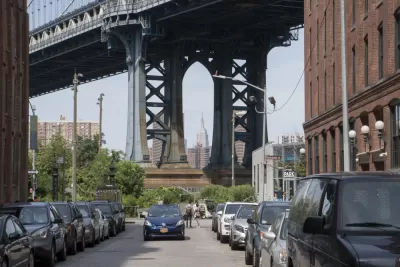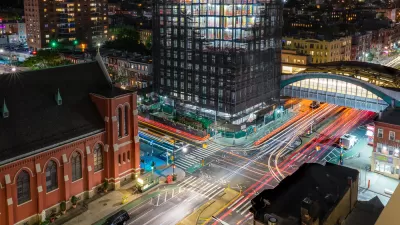Familiar controversies might seem reassuring in 2022.

Instagram has been making appearances in the Planetizen news feed since 2013, when an article originally published by UrbDeZine suggested that Instagram could be a valuable tool for planners.
The latest entry in the long history of think pieces examining the effect of Instagram on cities is by Ginia Bellafante, writing for the New York Times to ask, “Can a Neighborhood Be Instagrammed to Death?”
The article centers the experience of the far western stretch of Washington Street in Dumbo, along the Brooklyn waterfront, “where the arch of the Manhattan Bridge framing the Empire State Building in the distance dominates the view.” Washington Street has bee selfie central, according to Bellafante, as tourism has picked back up in New York City since the pandemic doldrums of 2020.
Locals are upset enough about the disruption caused by selfie-taking tourists that they have convened public meetings.
“The problem wasn’t simply the resurgent flood of humanity but also in part the economy that had evolved around it — the parade of food trucks, too many of which, neighbors maintained, were parked illegally and dumped trash with abandon,” writes Bellafante. “Navigation was already compromised by a renovation of the sewer system that had torn up various roadways; at the same time the city’s Department of Transportation had closed off a section of Washington Street adjacent to the popular tourist corridor to traffic, as part of the open streets program.”
According to Bellafante, the drama points to “a long-term failure of city planning” to engage with the formerly industrial neighborhood. The controversies are familiar, according to the article, even in the new world created by the pandemic: “a narrative of tensions among impassioned competing interests that all feel entitled to lay their personal claims to public space.” Bellefante suggests that the familiarity of the conflict is a "deeply reassuring" return to normal.
FULL STORY: Can a Neighborhood Be Instagrammed to Death?

Maui's Vacation Rental Debate Turns Ugly
Verbal attacks, misinformation campaigns and fistfights plague a high-stakes debate to convert thousands of vacation rentals into long-term housing.

Planetizen Federal Action Tracker
A weekly monitor of how Trump’s orders and actions are impacting planners and planning in America.

In Urban Planning, AI Prompting Could be the New Design Thinking
Creativity has long been key to great urban design. What if we see AI as our new creative partner?

King County Supportive Housing Program Offers Hope for Unhoused Residents
The county is taking a ‘Housing First’ approach that prioritizes getting people into housing, then offering wraparound supportive services.

Researchers Use AI to Get Clearer Picture of US Housing
Analysts are using artificial intelligence to supercharge their research by allowing them to comb through data faster. Though these AI tools can be error prone, they save time and housing researchers are optimistic about the future.

Making Shared Micromobility More Inclusive
Cities and shared mobility system operators can do more to include people with disabilities in planning and operations, per a new report.
Urban Design for Planners 1: Software Tools
This six-course series explores essential urban design concepts using open source software and equips planners with the tools they need to participate fully in the urban design process.
Planning for Universal Design
Learn the tools for implementing Universal Design in planning regulations.
planning NEXT
Appalachian Highlands Housing Partners
Mpact (founded as Rail~Volution)
City of Camden Redevelopment Agency
City of Astoria
City of Portland
City of Laramie





























